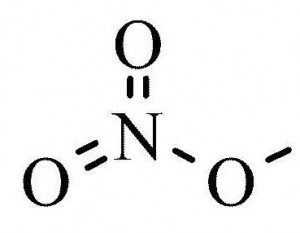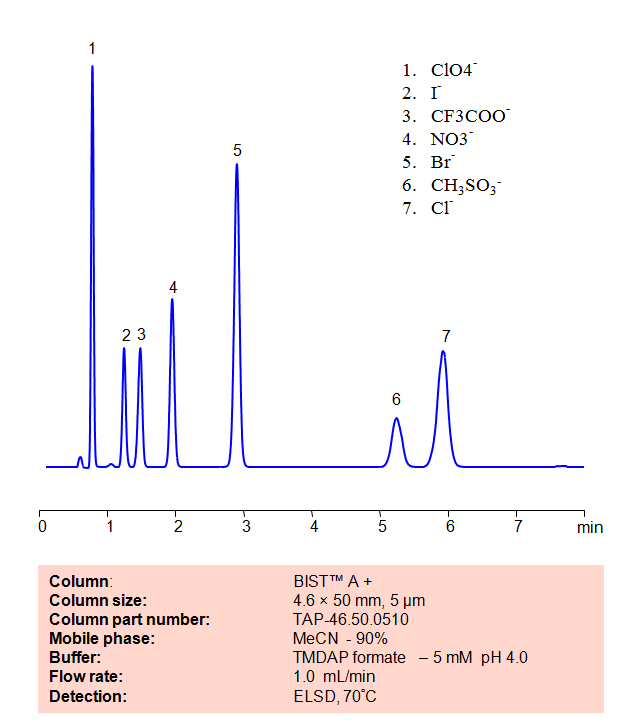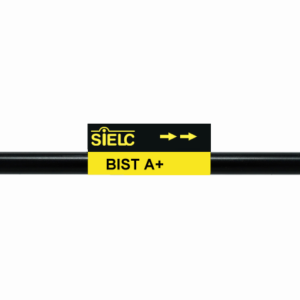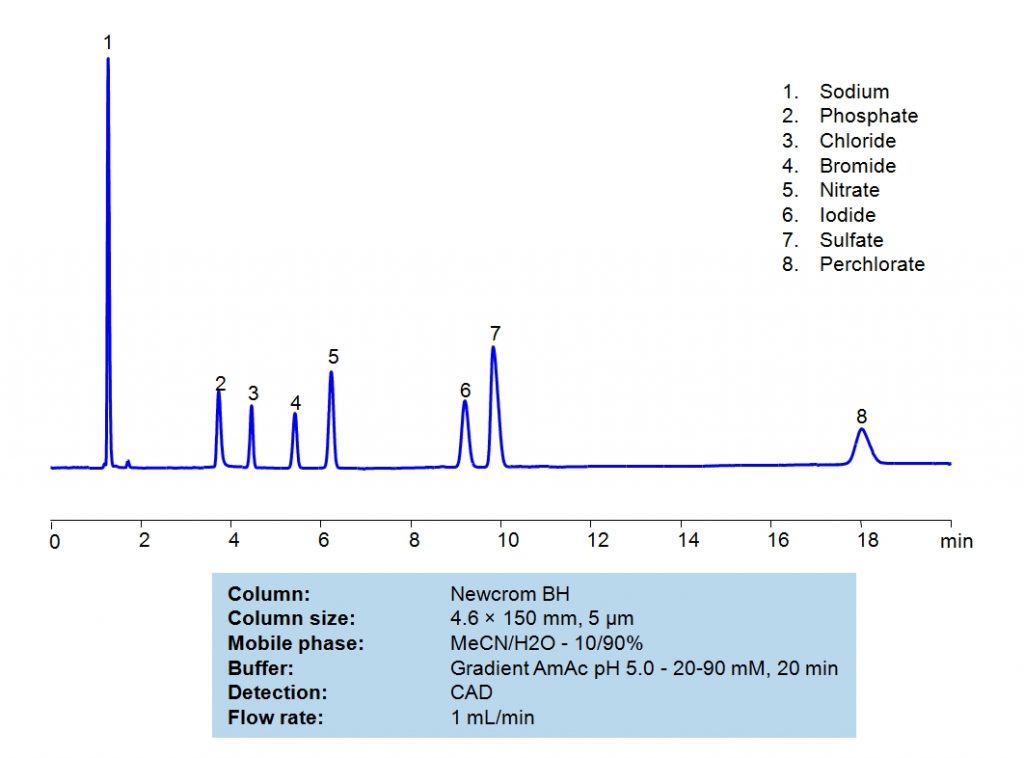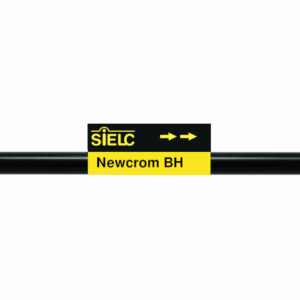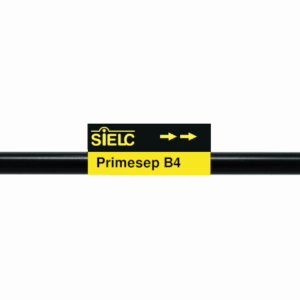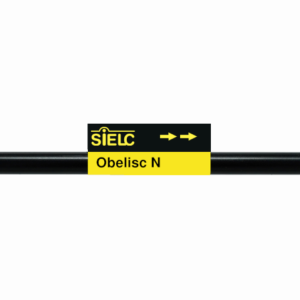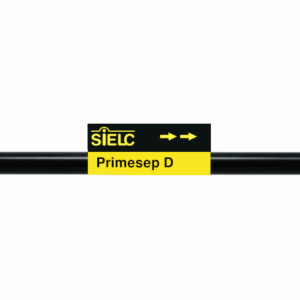| CAS Number | 14797-55-8 |
|---|---|
| Molecular Formula | NO3 |
| Molecular Weight | 62.005 |
| InChI Key | NHNBFGGVMKEFGY-UHFFFAOYSA-N |
| LogP | 0.21 |
| Synonyms |
|
Applications:
HPLC Method for Analysis of Inorganic anions on BIST™A+ Column
July 7, 2022
| Separation type: Bridge Ion Separation Technology, or BIST™ | ||||||||||||||
| High Performance Liquid Chromatography (HPLC) Method for Analysis of Inorganic anions, Chloride, Bromide, Nitrate, Iodide, Perchlorate
Using SIELC’s newly introduced BIST™ method, a mixture of many different inorganic anions can be separated on a negatively-charged, cation-exchange BIST™ A column, contrary to conventional chromatographic wisdom. There are two keys to this retention method: 1) a multi-charged, positive buffer, such as N,N,N’,N’-Tetramethyl-1,3-propanediamine (TMDAP), which acts as a bridge, linking the negatively-charged anion analytes to the negatively-charged column surface and 2) a mobile phase consisting mostly of organic solvent (such as MeCN) to minimize the formation of a solvation layer around the charged analytes. Other positively-charged buffers that can generate BIST™ include Calcium acetate and Magnesium acetate. Using this new and unique analysis method, these anions can be separated, retained, and detected through ELSD. This method is also compatible with Mass Spectrometry. |
||||||||||||||
|
Application Column
Chloride
Iodide
Methanesulfonic Acid
Nitrate
Perchlorate
TFA (Trifluoroacetic Acid)

HPLC Separation of Inorganic Anions on Newcrom BH Column
October 23, 2019
| Column | Newcrom BH, 4.6×150 mm, 5 µm, 100A |
| Mobile Phase | MeCN/H2O – 10/90% |
| Buffer | Gradient AmAc pH 5.0 – 20-90 mM , 20 min |
| Flow Rate | 1.0 ml/min |
| Detection | CAD (Corona) (MS-compatible mobile phase) |
| Class of Compounds | Ions, Hydrophilic, Ionizable |
| Analyzing Compounds | Sodium, Phosphate, Chloride, Bromide, Nitrate, Iodide, Sulfate, Perchlorate |
Application Column
Newcrom BH
The Newcrom columns are a family of reverse-phase-based columns. Newcrom A, AH, B, and BH are all mixed-mode columns with either positive or negative ion-pairing groups attached to either short (25 Å) or long (100 Å) ligand chains. Newcrom R1 is a special reverse-phase column with low silanol activity.
Select optionsChloride
Iodide
Iodine
Nitrate
Perchlorate
Phosphate
Sodium
Sulfate

HPLC Separation of Inorganic Anions
November 21, 2010
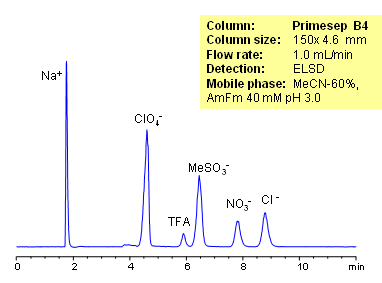
Organic and inorganic acids and ions can be separated on a Primesep B4 column based on their ionic properties. Method can be used for quantitation of residual acids in various products and sample matrices. Trifluoracetic, hydrochloric, methanesulfonic, and nitric acids are separated using ACN-water-ammonium formate. Ions can be detected by ELSD, CAD or LC/MS.
| Column | Primesep B4, 4.6×150 mm, 5 µm, 100A |
| Mobile Phase | MeCN/H2O |
| Buffer | AmFm |
| Flow Rate | 1.0 ml/min |
| Detection | ELSD |
| Class of Compounds |
Ions, Hydrophilic, Ionizable |
| Analyzing Compounds | Sodium, Phosphate, Chloride, Nitrate, Sulfate, Iodide, Perchlorate, Trifluoracetic |
Application Column
Primesep B4
The Primesep family of mixed-mode columns offers a wide variety of stationary phases, boasting unprecedented selectivity in the separation of a broad array of chemical compounds across multiple applications. Corresponding Primesep guard columns, available with all stationary phases, do not require holders. SIELC provides a method development service available to all customers. Inquire about our specially-tailored custom LC-phases for specific separations.
Select optionsMethanesulfonic Acid
Nitrate
Nitric Acid
Organic Acids
Perchloric Acid
TFA (Trifluoroacetic Acid)

HPLC Separation of Potassium, Perchlorate, Methanesulfonic, Chloride, Bromide, and Nitrate Ions on Obelisc N
March 3, 2010
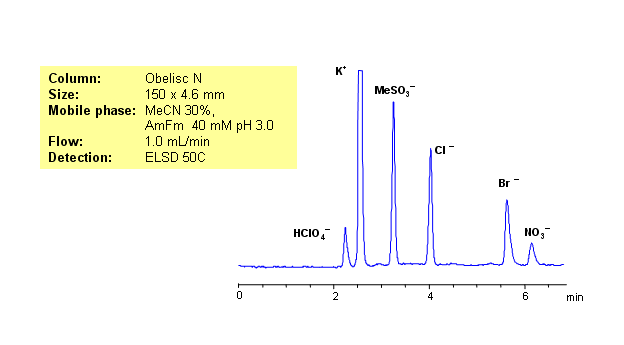
Ion chromatography is usually used for analysis of hydrophilic organic and inorganic ions. Same separation can be achieved on HILIC/mixed-mode Obelisc N HPLC columns. Obelisc N HPLC columns have very polar groups on their surface: one of the groups is basic and the other acidic. In case of low organic concentration, two groups are connected by hydrophilic linker. Obelisc N column can be used as cation-exchange and anion-exchange column. This allows to separate positively and negatively charged molecules in one run. Five anions (chloride, bromide, methanesulfonate, nitrate and perchlorate) along with one cation (sodium) were separated in one run. Method is compatible with ELSD, CAD and LC/MS and can be used for analysis of various hydrophilic and hydrophobic cations and anions in one HPLC run.
| Column | Obelisc N, 4.6×150 mm, 5 µm, 100A |
| Mobile Phase | MeCN/H2O |
| Buffer | AmFm |
| Flow Rate | 1.0 ml/min |
| Detection | ELSD |
| Class of Compounds |
Hydrophilic, Ions |
| Analyzing Compounds | Chloride, Nitrate, Chlorate, Bromide, Potassium |
Application Column
Obelisc N
SIELC has developed the Obelisc™ columns, which are mixed-mode and utilize Liquid Separation Cell technology (LiSC™). These cost-effective columns are the first of their kind to be commercially available and can replace multiple HPLC columns, including reversed-phase (RP), AQ-type reversed-phase, polar-embedded group RP columns, normal-phase, cation-exchange, anion-exchange, ion-exclusion, and HILIC (Hydrophilic Interaction Liquid Chromatography) columns. By controlling just three orthogonal method parameters - buffer concentration, buffer pH, and organic modifier concentration - users can adjust the column properties with pinpoint precision to separate complex mixtures.
Select optionsChloride
Methanesulfonic Acid
Nitrate
Nitric Acid
Potassium

HPLC Separation of Chloride and Nitrate Ions
January 13, 2005
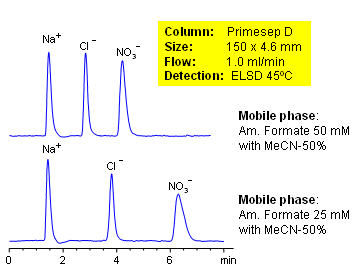
High nitrate concentrations in water and soil can be toxic to humans, fish and domestic animals. Chloride can be used for analysis of water contamination. Primesep D column can be used to separate and quantify both ions. The baseline separation between chloride and nitrate can be increased by decreasing the ammonium formate concentration in the mobile phase. Evaporative Light Scattering Detection (ELSD) used.
| Column | Primesep D, 4.6×150 mm, 5 µm, 100A |
| Mobile Phase | MeCN/H2O |
| Buffer | AmFm |
| Flow Rate | 1.0 ml/min |
| Detection | ELSD |
| Class of Compounds |
Hydrophilic, Ion |
| Analyzing Compounds | Chloride, Nitrate |
Application Column
Primesep D
The Primesep family of mixed-mode columns offers a wide variety of stationary phases, boasting unprecedented selectivity in the separation of a broad array of chemical compounds across multiple applications. Corresponding Primesep guard columns, available with all stationary phases, do not require holders. SIELC provides a method development service available to all customers. Inquire about our specially-tailored custom LC-phases for specific separations.
Select optionsNitrate
Nitric Acid
Sodium

